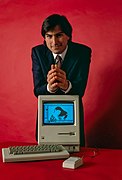Portal:Internet
The Internet PortalThe Internet (or internet) is the global system of interconnected computer networks that uses the Internet protocol suite (TCP/IP) to communicate between networks and devices. It is a network of networks that consists of private, public, academic, business, and government networks of local to global scope, linked by a broad array of electronic, wireless, and optical networking technologies. The Internet carries a vast range of information resources and services, such as the interlinked hypertext documents and applications of the World Wide Web (WWW), electronic mail, internet telephony, and file sharing. The origins of the Internet date back to research that enabled the time-sharing of computer resources, the development of packet switching in the 1960s and the design of computer networks for data communication. The set of rules (communication protocols) to enable internetworking on the Internet arose from research and development commissioned in the 1970s by the Defense Advanced Research Projects Agency (DARPA) of the United States Department of Defense in collaboration with universities and researchers across the United States and in the United Kingdom and France. The ARPANET initially served as a backbone for the interconnection of regional academic and military networks in the United States to enable resource sharing. The funding of the National Science Foundation Network as a new backbone in the 1980s, as well as private funding for other commercial extensions, encouraged worldwide participation in the development of new networking technologies and the merger of many networks using DARPA's Internet protocol suite. The linking of commercial networks and enterprises by the early 1990s, as well as the advent of the World Wide Web, marked the beginning of the transition to the modern Internet, and generated sustained exponential growth as generations of institutional, personal, and mobile computers were connected to the internetwork. Although the Internet was widely used by academia in the 1980s, the subsequent commercialization of the Internet in the 1990s and beyond incorporated its services and technologies into virtually every aspect of modern life. (Full article...) Selected articleThe iLoo (short for Internet loo) was a cancelled Microsoft project to develop a Wi-Fi Internet-enabled portable toilet. The iLoo, which was to debut at British summer festivals, was described as being a portable toilet with wireless broadband Internet, an adjustable plasma screen, a membrane wireless keyboard, a six-channel speaker system, and toilet paper embossed with popular web site addresses. The iLoo was also to have an extra screen and keyboard on the outside, and was to be guarded. It was intended as the next in a series of successful initiatives by MSN UK which sought to introduce the internet in unusual locations, including MSN Street, MSN Park Bench and MSN Deckchair. The project was announced by MSN UK on April 30, 2003, and was widely ridiculed before being declared a hoax by Microsoft on May 12. On May 13, another Microsoft press release stated that although the project had not been a hoax, it had been cancelled because it would do little to promote the MSN brand. There has since been speculation as to whether the project was cancelled for fear of being sued by Andrew Cubitt, who had invented the similarly named product "i-Loo". The iLoo was described as a public relations "debacle" by Online Journalism Review. Selected picture "All your base are belong to us" (often shortened to "All Your Base", "AYBABTU", or simply "AYB") is a broken English phrase (see Engrish) that sparked an Internet phenomenon in 2001 and 2002, with the spread of a Flash animation that depicted the slogan. The text is taken from the opening cut scene of the European Sega Mega Drive version of Zero Wing, a Japanese video game by Toaplan. News
Wikinews Internet portal
WikiProjects
Did you know (auto-generated) -
Selected biography
Barry Diller (born February 2, 1942 in San Francisco, California) is media executive responsible for the creation of Fox Broadcasting Company. Diller is currently the Chairman of Expedia and the Chairman and Chief Executive Officer of IAC/InterActiveCorp, an interactive commerce conglomerate and the parent of companies including ServiceMagic, Home Shopping Network, Ticketmaster, Match.com, Citysearch, LendingTree and CollegeHumor. In 2005, IAC/InterActiveCorp acquired Ask.com, marking a strategic move into the Internet search category. Diller has been on the board of The Coca-Cola Company since 2002. The new headquarters of IAC/InterActiveCorp was designed by Frank Gehry and opened in 2007 at 18th Street and the West Side Highway in Manhattan's Chelsea neighborhood. The western half of the block is dedicated to the building which stands several stories taller than the massive Chelsea Piers Sporting complex just across the West Side Highway. The extra floors guarantee a panoramic Hudson River view from Diller's top-floor office.
General images -The following are images from various internet-related articles on Wikipedia.
Selected quoteMore Did you know...
Main topics
Featured contentCategoriesRelated portalsThings you can do
Associated WikimediaThe following Wikimedia Foundation sister projects provide more on this subject:
Wikipedia's portals |





















































